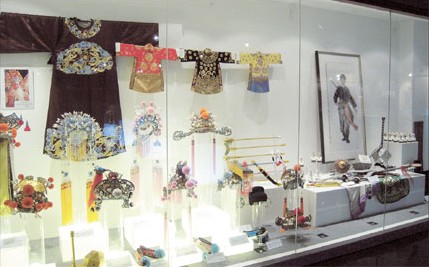Museum beckons opera lovers
Lavish costumes worn by famous Chinese artists, the stage prop swords they wielded and fans they held are among the cultural artifacts of traditional operas on display in a new museum in Minhang District.
|
|
|
Costumes worn by famous performers, ornaments, swords and other props, and musical instruments are on display at the newly opened Shanghai Traditional Chinese Opera Museum.?[Shanghai Daily] |
The newly opened Shanghai Traditional Chinese Opera Museum features the dramatic history, costumes, characters and great performers of the many types of theater - Kunqu Opera, Peking Opera, Yueju Opera and others.
The museum opened this month in the Shanghai Theater Academy's Lianhua campus on Lianhua Road in Minhang District.
It will frequently be used by scholars and opera students, who will learn from the masters and rehearse there.
It will include recordings, video and feature films of major operas. Costumes worn by famous performers, ornaments, swords, props and musical instruments from around China will be displayed. The stories and lore of opera will unfold.
It will also be used for education to promote appreciation of traditional operas among Chinese young people.
Traditional Chinese opera, sometimes called the "crown of Chinese culture," dates back to the Han (206 BC-AD 220) and Tang (AD 618-907) dynasties. It took shape in the Song (960-1279) and Yuan (1271-1368) dynasties, and reached its pinnacle in the Ming (1368-1644) and Qing (1644-1911) dynasties.
In late 2005, experts started to establish the museum but it took three years of preparation and collection of valuable items for display.
"In recent years many famous and revered artists died and some of the art form has been lost," says curator Wang Bonan, who is also the general planner of "Fenmo Zhonguo" program that include a series of classical opera performances.
Much was lost in the "cultural revolution" (1966-76), when traditional operas were banned (only model operas were permitted), and performers and scriptwriters were persecuted. Costumes, sets and props were destroyed.
"At the beginning, we didn't have much to display in the museum," says Wang, "but we were able to open thanks to donations by relatives of famous artists and contributions of others."
Among the exhibits:
Stage props used by Gai Jiaotian (1888-1971), a famed wu sheng (martial artist role) in Peking Opera, were donated by his relatives.
Costumes worn by Peking Opera artist Yu Zhenfei (1902-93) were donated by his wife. All costumes were made by hand; different roles required different costumes. The colors, the needlework patterns of flowers plants and animals all indicated character.
A full costume set worn by Peking Opera artist Zhou Xinfang (1895-1975) in the famous play "Si Jin Shi" was donated by his son, Zhou Shaolin. It includes robes, a green cape, footwear embroidered with dragon patterns and an orange hat decorated with pearls.
"Many characters are exemplars of morality and integrity, wisdom and purity," says Wang.
All the costumes were made by hand using famous Su-style (from Suzhou, Jiangsu Province) needlework. They were made from luxurious materials - silk, satins, brocades - and some designs were stitched with gold and silver thread. Pearls were often used and dragon and phoenix patterns were frequently embroidered.
Other museums of Chinese arts are planned by the Shanghai Theater Academy. Drama and film will be showcased on the Huashan campus in Jing'an District. Many kinds of dance will be featured in the Hongqiao campus in Changning District.
"Carrying forward the spirit of Chinese arts and transmitting their essence is not only the requirement for the Chinese nation but also a major responsibility that our school should shoulder," says Lou Wei, Party secretary of the Shanghai Theater Academy.
Date: Daily
Address: 211 Lianhua Rd, Shanghai
Tel: 86-021-6248 7731
Admission: Free
 0 Comments
0 Comments







